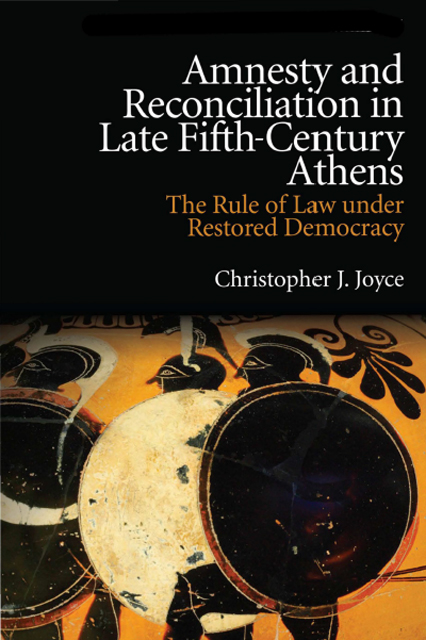Book contents
- Frontmatter
- Contents
- Preface and Acknowledgements
- List of Abbreviations
- 1 Introduction: The Athenian Reconciliation in Modern Scholarship
- 2 Civil Strife at Athens, 404–403
- 3 Oaths and Covenants
- 4 The Legal Scrutiny and the Resurrection of the Rule of Law
- 5 The Amnesty Applied (I): The Trials of Agoratus and Eratosthenes
- 6 The Amnesty Applied (II): The Trials of Callimachus and Socrates
- 7 The Athenian Reconciliation as the Paradigm for the Greek World in the Classical and Hellenistic Ages
- 8 The Rule of Law Restored: The Legacy of the Reconciliation in the Fourth Century
- Bibliography
- Index Locorum
- Subject Index
5 - The Amnesty Applied (I): The Trials of Agoratus and Eratosthenes
Published online by Cambridge University Press: 03 June 2023
- Frontmatter
- Contents
- Preface and Acknowledgements
- List of Abbreviations
- 1 Introduction: The Athenian Reconciliation in Modern Scholarship
- 2 Civil Strife at Athens, 404–403
- 3 Oaths and Covenants
- 4 The Legal Scrutiny and the Resurrection of the Rule of Law
- 5 The Amnesty Applied (I): The Trials of Agoratus and Eratosthenes
- 6 The Amnesty Applied (II): The Trials of Callimachus and Socrates
- 7 The Athenian Reconciliation as the Paradigm for the Greek World in the Classical and Hellenistic Ages
- 8 The Rule of Law Restored: The Legacy of the Reconciliation in the Fourth Century
- Bibliography
- Index Locorum
- Subject Index
Summary
The Amnesty of 403 was followed by several famous court cases which have captured modern attention. Because of a common misconception in scholarship to date that Athenian litigation paid scant attention to legal principle, some have asserted that in the high political temperature of 403–398, Athenians from various political motives used the courts to vent their anger. These trials are thereby dubbed ‘political’ trials, as if the principle at stake had been a political and not a legal one. As argued in Chapters 2 and 4, the misuse of the courts in the decades leading up to the establishment of the Thirty resulted in the politicisation of Athens’ legal and judicial machinery, which, in turn, gave the Thirty once in power the political excuse to suppress and undermine the authority of the law. Once democracy was restored, however, the reverse needed to happen. Chapter 4 argued that once the Oaths of Reconciliation were sworn, the most pressing and urgent need was to rebuild a city which respected the rule of law. This meant above all that the courts should not be used as political venues to discredit opponents or nurse grudges. The rule μὴ μνησικακεῖν, discussed at Chapter 3 and again in Chapter 7, first and foremost forbade reference to events predating 403 in the courts, but beyond that it sought to ensure that never again would the ghastly caricature of the law which Cleon and his successors had initiated after the death of Pericles in 429 resurface. In order to guarantee against this, it was vital that legal cases structure themselves around a legal, and not a political, issue. One of the chief aims of the present chapter is to show that the trials hinged on a legal principle, and that the scourge of sycophancy which had bedevilled Athens before 404 was now banished.
The scrutiny of the laws in 403 was the key moment when the rule of law was affirmed. Once Athenians had worked out a way to prevent civil war reigniting, the paramount task was to ensure that the newly resurrected democracy was governed under a system of law which was coherent, unified, accessible and universally recognised. Without such a system, the freshly constituted democracy would have degenerated into the legal quagmire which had prevailed in the last years of the fifth century when, as Lys.
- Type
- Chapter
- Information
- Amnesty and Reconciliation in Late Fifth-Century AthensThe Rule of Law under Restored Democracy, pp. 126 - 157Publisher: Edinburgh University PressPrint publication year: 2022

